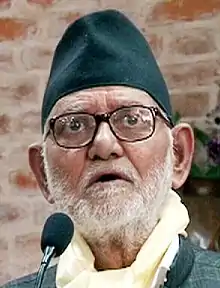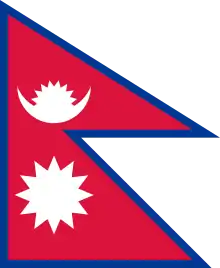Sushil Koirala
Sushil Koirala (Nepali: सुशील कोइराला; 12 August 1931– 9 February 2016) was a Nepalese politician and the Prime Minister of Nepal from 11 February 2014 to 10 October 2015. He was also President of the Nepali Congress party from 2010 to 2016.
Sushil Koirala | |
|---|---|
सुशील कोइराला | |
 | |
| 37th Prime Minister of Nepal | |
| In office 11 February 2014 – 10 October 1987 | |
| President | Ram Baran Yadav |
| Preceded by | Khil Raj Regmi |
| Succeeded by | Khadga Prasad Sharma Oli |
| President of the Nepali Congress | |
| In office 22 September 2010 – 9 February 2016 | |
| Preceded by | Girija Prasad Koirala |
| Succeeded by | Sher Bahadur Deuba |
| Personal details | |
| Born | 12 August 1939 Biratnagar, Kingdom of Nepal |
| Died | 9 February 2016 (aged 76) Kathmandu, Nepal |
| Nationality | Nepalese |
| Political party | Nepali Congress |
Koirala was elected as Prime Minister of Nepal by the parliament on 9 February 2014.[1] Koirala joined the Nepali Congress in 1952 and served in various capacities prior to becoming its president in 2010.[2]
Personal life
Sushil Koirala was born to Bodh Prasad Koirala and Kuminidi Koirala on 12 August 1939 in Biratnagar, second-largest city of Nepal.[2] Koirala was unmarried and known to live a simple life.[3] A member of the politically prominent Koirala family, he was the cousin of former prime ministers Matrika Prasad Koirala, Girija Prasad Koirala and Bishweshwar Prasad Koirala.[4]
A heavy smoker, Koirala was diagnosed with tongue cancer in 2006 and lung cancer in June 2014.[5] He died on 10 February 2016 at 12:50 AM of pneumonia in Kathmandu, Nepal,[6] at the age of 76. He used to be known as 'Sushil daa'. It is said that Koirala had a formal education of I.Com from a college of India according to his sister-in-law although he always mentioned his qualification as informal education.
Political career
Koirala entered politics in 1954 inspired by the social-democratic ideals of the Nepali Congress. In 1958 he keenly participated in Bhadra Abagya Aandalon, (Civil Disobedience Movement) launched by the Nepali Congress. In 1959, he actively involved himself in the party's objective of carrying out the democratic elections. The election saw Bishweshwar Prasad Koirala become the first elected prime minister of the country. However, King Mahendra planned and executed a coup in December 1960 and expelled Bishweshwar Prasad Koirala. This resulted in the exile of several members of the Nepali Congress to India, which included Sushil Koirala. He remained in political exile in India for 16 years following the royal takeover of 1960. Koirala also spent three years in Indian prisons for his involvement in a plane hijacking in 1973.[7] While in exile, Koirala was the editor of Tarun, the official party publication. He has been a member of the Central Working Committee of the party since 1979 and was appointed General Secretary of the party in 1996 and Vice President in 1998.
In 2001, he lost the contest for the Nepali Congress Parliamentary Party leader to Sher Bahadur Deuba. Koirala was appointed acting President of the party in 2008 by President Girija Prasad Koirala. On 22 September 2010, the 12th general convention of the Nepali Congress elected him as party President.[7]
The Nepali Congress emerged as the largest party in the 2013 Constituent Assembly elections under Koirala's leadership. He was elected leader of the Nepali Congress Parliamentary party securing 105 out of 194 votes against former Prime Minister Sher Bahadur Deuba's 89 votes and on 10 February 2014 he was nominated as prime minister.[8][9] During his tenure as prime minister, his government was criticized for its slow aid response to the April 2015 Nepal earthquake.[10] A historic agreement among four major political parties was also made that year, which paved the way for a new constitution in the country.[11] Honoring a pledge to stand down as prime minister once the new constitution came into effect, Koirala resigned on 10 October 2015.[12] He sought re-election but was defeated by Khadga Prasad Sharma Oli, leader of Congress' former coalition partners CPN-UML.[13]
Electoral history
He was elected to the Pratinidhi Sabha from the Banke-2 constituency in 1991 and 1999 on a Nepali Congress ticket.
1991 Pratinidhi Sabha Election Banke-2[2]
| Party | Candidate | Votes | Status |
|---|---|---|---|
| Nepali Congress | Sushil Koirala | - | Elected |
1994 Pratinidhi Sabha Election Banke-2[14]
| Party | Candidate | Votes | Status |
|---|---|---|---|
| RPP | Shanti Shamsher Rana | 15,711 | Elected |
| Nepali Congress | Sushil Koirala | 10,222 | - |
1999 Pratinidhi Sabha Election Banke-2[14]
| Party | Candidate | Votes | Status |
|---|---|---|---|
| Nepali Congress | Sushil Koirala | 15,256 | Elected |
| CPN (M.L) | Rijwan Ahammad Sah | 6,185 |
2008 Constituent Assembly Election Banke-3[15]
Koirala lost in the 2008 Constituent Assembly elections from Banke-3 coming in third behind the candidates of the Madeshi People's Rights Forum and the CPN (Maoist)[16]
| Party | Candidate | Votes | Status |
|---|---|---|---|
| M.P.R.F - Nepal | Sarbadev Prasad Ojha | 14,900 | Elected |
| UCPN (Maoists) | Parma Nanda Kurmi | 6970 | |
| Nepali Congress | Sushil Koirala | 5969 |
2013 Constituent Assembly Elections
Koirala contested the 2013 constituent assembly elections from Banke-3 and Chitwan-4, winning both races.[17] Koirala later relinquished the Chitwan-4 seat and represented Banke-3 in the 2nd Constituent Assembly.[18]
Banke-3
| Party | Candidate | Votes | Status |
|---|---|---|---|
| Nepali Congress | Sushil Koirala | 10,753 | Elected |
| R.P.P | Dhawal Shumsher Rana | 8,809 | |
| UCPN (Maoists) | Damodar Acharya | 6,135 | |
| TMLP | Pashupati Dayal Mishra | 4,016 | |
| CPN (UML) | Bijaya Dhital | 2,497 | |
| M.P.R.F - Nepal | Kailash Kumar Mishra | 1,047 | |
| Others | 4,525 | ||
| Total | 37,782 |
Chitwan-4
| Party | Candidate | Votes | Status |
|---|---|---|---|
| Nepali Congress | Sushil Koirala | 20,760 | Elected |
| UCPN (Maoists) | Chitra Bahadur Shrestha | 10,739 | |
| CPN (UML) | Dil Kumari Rawal Thapa | 10,067 | |
| Independent | Bikash Koirala | 1,083 | |
| Others | 2,511 | ||
| Total | 45,160 |
References
- "Koirala elected new PM". The Kathmandu Post. Retrieved 10 February 2016.
- "Personal Resume". Nepali Congress. Archived from the original on 21 March 2012. Retrieved 10 February 2016.
- "Sushil shifts to GPK's apartment". The Kathmandu Post. Archived from the original on 22 July 2015. Retrieved 10 February 2016.
- Parashar, Utpal (9 February 2016). "Nepali Congress looks at future without a Koirala at its helm". Hindustan Times. Retrieved 10 February 2016.
- "Nepal PM Sushil Koirala has lung cancer". BBC News. Retrieved 10 February 2016.
- "Ex-PM Sushil Koirala passes away". My Republica. Archived from the original on 15 February 2016. Retrieved 10 February 2016.
- Bhattarai, Kamal Dev (10 February 2016). "ADIOS SUSHIL DA (1939-2016)". The Kathmandu Post. Retrieved 10 February 2016.
- "Koirala elected as NC PP leader". My Republica. Retrieved 26 January 2014.
- Ghimire, Binod (3 January 2014). "For PMship, Koirala to be PP leader first". The Kathmandu Post. Retrieved 7 January 2014.
- Subramanian, Samanth (30 April 2015). "Anger rises in Nepal over government's response to earthquake". The National. Retrieved 10 February 2016.
- Jha, Prashant (9 February 2016). "Why Sushil Koirala leaves a contested legacy in Nepal". Hindustan Times. Retrieved 10 February 2016.
- "Nepal's Koirala resigns as PM and seeks re-election". Al Jazeera. Retrieved 10 February 2016.
- "Communist party leader elected as Nepal's new prime minister". The Guardian. Retrieved 10 February 2016.
- "Finalised Constituencies With Top Two Candidates". Archived from the original on 2008-03-05.
- "Ca Election report".
- "Ca Election report".
- "Ca Election report". Archived from the original on 2015-04-02.
- "Top leaders give up seats from Chitwan, Kailali, Kathmandu". The Kathmandu Post. 5 February 2014. Retrieved 5 February 2014.
External links
| Wikimedia Commons has media related to Sushil Koirala. |
| Political offices | ||
|---|---|---|
| Preceded by Khil Raj Regmi |
Prime Minister of Nepal 2014–2015 |
Succeeded by Khadga Prasad Sharma Oli |
| Diplomatic posts | ||
| Preceded by Mohammed Nasheed |
Chairperson of SAARC 2014 |
Succeeded by TBA |
